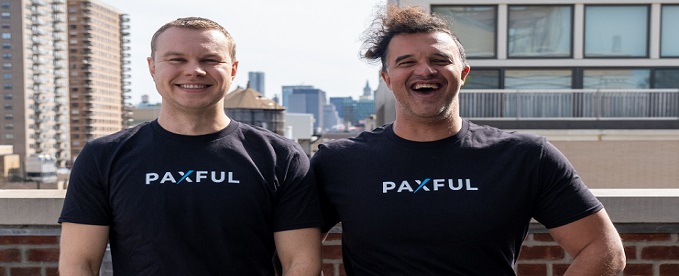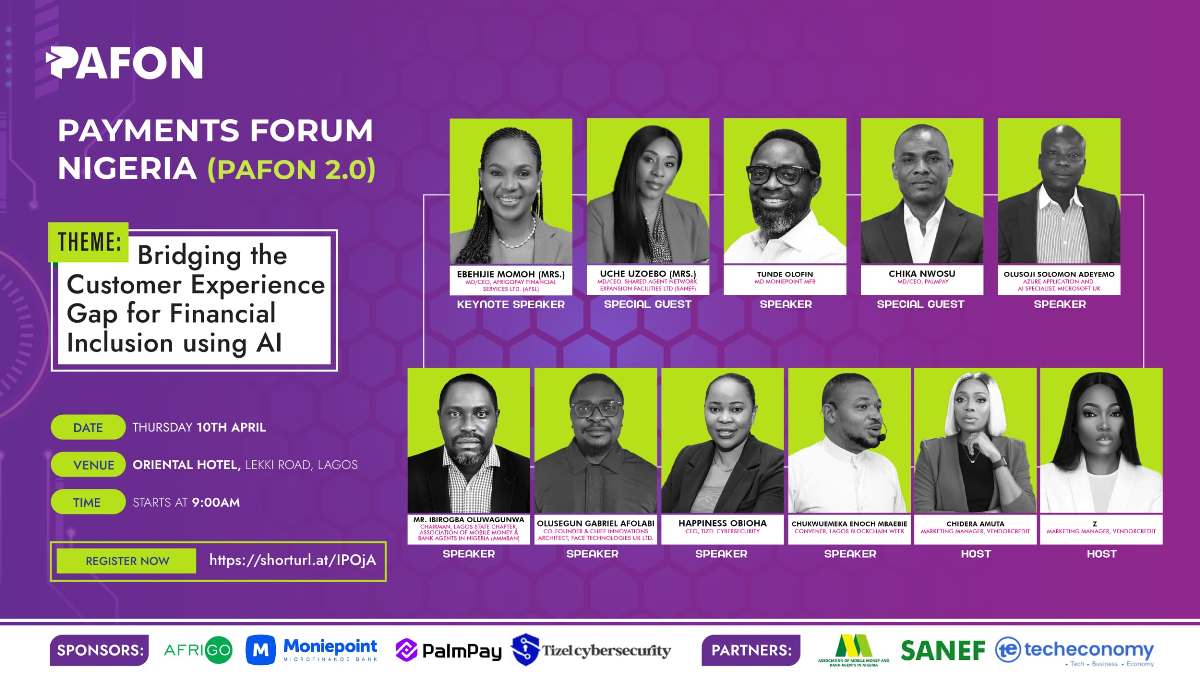E-Financial
Paxful and the Built with Bitcoin Foundation to Fund the Qala Fellowship

Paxful, the leading global peer-to-peer fintech platform with 2.5 million African users, announced that it will be donating to the Human Rights Foundation, a nonpartisan, nonprofit organization that promotes and protects human rights globally, with a focus on closed societies.

Paxful will be making the donation alongside the Built With Bitcoin Foundation, a humanitarian organization devoted to creating equitable opportunity by providing clean water, access to quality education, sustainable farming, and humanitarian support—all powered by cryptocurrencies.
The donation will fund the Qala Fellowship, a program to find and grow local Nigerian talent starting with developers to build careers in the Bitcoin space.
The Qala Fellowship, which is currently accepting applications, aims to get more developers from Africa working on Bitcoin, building their own companies, contributing to open source, and/or getting jobs working on Bitcoin in different companies. Developers will also receive a monthly stipend so they can stay focused on course work.
Starting with ten developers, the academy’s inaugural program will consist of a six-month intensive bootcamp focused on how to build on Bitcoin and provide students with the resources they need to succeed — such as connections for internships or full-time roles and guidance on contributing to core and other Bitcoin open source projects. During the course, participants will also hear career talks from other developers, CEOs, product managers, and experienced players in the Bitcoin space. The goal is to scale the initiative by developing a framework and curriculum that can be replicated for similar programs in both Nigeria and other parts of the world.
Ray Youssef, co-founder and CEO of Paxful, said: “Paxful follows energy and it’s clear that the Nigerian youth will make a profound impact on the global economy through Bitcoin. They have entrepreneurship baked into their DNA but they have not been given the chance to showcase their talent on the global stage. First and foremost, the Qala Fellowship is a career roadmap for Nigerian developers. But it also is a way to support the local economy and a means for Bitcoin to capture more developer mindshare. We’re proud to fund this project and cannot wait to see what these developers create.”
Alex Gladstein, chief strategy officer at the Human Rights Foundation, said: “If Bitcoin is going to be a global currency, then it needs to be built by people around the world. There are millions upon millions of Bitcoin users in Nigeria, Ghana, Kenya, South Africa, and other nations, but relatively few Bitcoin developers and contributors coming from these regions. We are delighted to support the Qala Fellowship to bring more African perspectives and talents into the Bitcoin project and ecosystem.”
Bernard Parah, program lead of the Qala Fellowship and the co-founder and CEO of Bitnob, said: “Growing up in Nigeria, I have a fierce sense of pride for local developers looking to make a difference. I’ve also seen what Bitcoin is capable of doing – with far reaching implications beyond speculation. I’m incredibly proud to lead the development and enactment of this program as I believe that Africa has a lot to contribute to the Bitcoin economy. And we’re just getting started.”
Founded in 2015 and completely bootstrapped since then, Paxful is headquartered in New York with offices in Estonia, the Philippines and Russia.
The team has doubled in size over the last 12 months, growing to over 400 people.
E-Financial
AfDB Mobilizes $2.2Bn to Support Nigeria’s Agriculture

African Development Bank (AfDB) is mobilising $2.2 billion to develop agricultural processing zones in 28 states in Nigeria to boost food security and create jobs, Akinwumi Adesina, the bank’s president said on Tuesday.

Adesina was speaking in northern Kaduna state while launching the first phase of the initiative that is targeting five states. This phase is being bankrolled by more than $500 million that was first announced in 2022.
The AfDB head said the funding needs for the second phase would be presented to the AfDB board shortly for approval.
“We have been able, I would like to say, to mobilize $2.2 billion of investment interest to support the second phase across Nigeria,” he said during the ceremony in Kaduna.
Adesina said besides the AfDB, Arab Bank for Economic Development, Africa Import-Export Bank, agri-investment fintech Sahara Farms and French and U.S. institutions were among institutions that would help raise the $2.2 billion.
The agro-processing zones aim to create facilities to process agricultural produce closer to farmers, which will reduce post-harvest losses and strengthen value chains from farms to market.
Last year, Nigeria spent $4.7 billion importing food, the AfDB said, a trend authorities also hope to reverse with more investment in the farming sector.
E-Financial
Court Delays $81.5Bn Tax Evasion Case against Binance

Nigerian authorities have postponed legal proceedings against Binance as tensions persist over the crypto exchange’s role in the country’s economic troubles.

According to a recent report, a court in Nigeria has pushed back the tax evasion case to April 30.
The delay gives the Federal Inland Revenue Service (FIRS) more time to respond to Binance’s request to cancel a previous court order that allowed legal documents to be served to the company via email.
The FIRS initially filed the lawsuit in February, claiming Binance owes the country a whopping $2 billion in taxes along with an additional $79.5 billion in economic damages.
Related court filings reveal that the agency is pushing for the exchange to pay corporate income taxes for the years 2022 and 2023.
On top of that, FIRS has demanded a 10% annual penalty on the unpaid taxes and nearly 27% interest on the outstanding amounts.
The agency has argued that Binance’s level of business activity qualifies as a “significant economic presence” in Nigeria, thereby making it liable for taxation under local law.
Binance, however, has challenged the court’s earlier decision to allow the order to be served via email.
According to Chukwuka Ikwuazom, Binance’s attorney, the order should be annulled, as Binance is registered in the Cayman Islands, has no physical office in Nigeria, and was served without proper court authorisation for cross-border delivery.
Since expanding its services to Nigeria on October 24, 2019, with the addition of Naira, Binance’s journey in the West African country has been marred with regulatory pushback.
Things came to a head in February 2024 when two Binance executives, Tigran Gambaryan, a US citizen, and Nadeem Anjarwalla, a British-Kenyan national, were unexpectedly detained by Nigerian authorities.
The executives had travelled to Abuja for what was supposed to be a series of meetings with government officials to address concerns around Binance’s local operations.
Instead, they were arrested and charged with tax evasion and money laundering.
The situation took a dramatic turn when Anjarwalla escaped custody in March and fled the country, reportedly making his way to Kenya, where he remains at large.
Gambaryan, however, stayed behind bars for months.
As previously covered on Invezz, reports soon started to surface that Gambaryan was suffering from pneumonia, malaria, and a herniated spinal disc, all while allegedly being denied proper medical attention.
His detention caught the attention of US lawmakers, which even led Representative Rich McCormick to introduce a resolution in July 2024 that classified his arrest as a hostage situation.
By October, the Nigerian government dropped the money laundering charges against Gambaryan, leading to his release on October 23, 2024.
He returned to the US the same month, bringing an end to a nearly seven-month-long detention.
In between, Binance officially halted all naira-related services and exited the Nigerian market in March 2024.
E-Financial
Moniepoint Leads the Charge for Financial Inclusion @PAFON 2.0

Moniepoint Microfinance Bank, a subsidiary of Moniepoint Inc., Africa’s leading digital financial services provider and the Continent’s fastest growing financial institution, is set to demonstrate its continuous innovations towards advancing financial inclusion in Nigeria.

The Federal Government recently hailed the contributions and remarkable achievements of Africa’s fastest-growing financial institution, Moniepoint Inc in the financial technology sector, its commitment to advancing financial inclusion, and its ongoing collaborations with law enforcement agencies to combat financial fraud.
Mr. Babatunde Olofin, the managing director, Moniepoint Microfinance Bank, has been announced among industry leaders to speak at the Payments Forum Nigeria (PAFON).
The Forum scheduled to hold on Thursday, April 10, 2025 at the Function Room 1, Oriental Hotel, Lekki Road, Lagos, has as the theme: “Bridging the Customer Experience Gap for Financial Inclusion Using AI”.
Babatunde Olofin is a digital innovator, entrepreneur and experienced banker; with two decades experience in digital financial product management within the telecoms, banking and fintech space.
Under his leadership, Moniepoint MFB is focused on providing comprehensive banking services that support the financial well-being of individuals and businesses across Nigeria.
Tunde is a well sought after conference speaker for the clarity and depth of thought he brings to issues around the transformation of Nigeria’s digital banking landscape.
He will join other speakers, namely, Ebehijie Momoh (Mrs), managing director and chief executive officer, AfriGoPay Financial Services Ltd., Uche Uzoebo (Mrs), managing director and chief executive officer, Shared Agent Network Expansion Facilities (SANEF) Limited and Mrs. Chika Nwosu, managing director and chief executive officer of PalmPay (Nigeria). and Fasasi Atanda, national president of the Association of Mobile Money and Bank Agents in Nigeria (AMMBAN).
Others include, Happiness Obioha, CEO, Tizel Cybersecurity, Olusoji Solomon Adeyemo, Azure Application and AI Specialist, Microsoft UK., Ibirogba Oluwagunwa, chairman, Lagos State Chapter, Association of Mobile Money and Bank Agents in Nigeria (AMMBAN), Olusegun Gabriel Afolabi, co-founder & chief innovations architect, Face Technologies UK Ltd., and Chukwuemeka Enoch Mbaebie, the convener, Lagos Blockchain Week.
Chidera Amuta, Marketing Manager, Vendorcredit, is the event host.
According to Mr. Chike Onwuegbuchi, co-convener of Payments Forum Nigeria, “this year’s theme, ‘Bridging the Customer Experience Gap for Financial Inclusion Using AI’, underscores the urgent need to safeguard digital transactions against emerging threats while ensuring seamless financial inclusion and innovation”.
PAFON 2.0 will feature keynote presentation, fireside chat, panel discussion, networking opportunities, among other activities aimed at enabling knowledge sharing on key industry insights, issues, amongst key stakeholders, with the objective of ensuring a collaborative and proactive approach to push for policies that enable growth, tackling/mitigating fraud and limiting occurrences and losses in the payment industry.
Industry players such as Bankers, Fintech startups, mobile money operators, blockchain experts, Cybersecurity, etc., are among the expected attendees.

 News3 days ago
News3 days agoAOT Issues Bench Warrant against Sanusi, Aero Contractors MD

 News3 days ago
News3 days agoUS Cancels Visas for All South Sudanese Passport Holders

 News3 days ago
News3 days agoMeningitis Outbreak Kills 151 in Nigeria – NCDC

 News3 days ago
News3 days agoAfrimash Launches USSD Code to Revolutionize Poultry Farming and Combat Counterfeit Farm Produce

 News3 days ago
News3 days agoSERAP Calls on Tinubu to Reject $1.08Bn Loan, Probe Missing Funds

 News2 days ago
News2 days agoHow KongaFM 103.7 Helped Cure My Insomnia Challenge

 Broadcasting2 days ago
Broadcasting2 days agoMTN Battles Netflix, Showmax with New Streaming Platform

 News2 days ago
News2 days agoFG to Invest in Cutting-edge Broadcast Technology



























